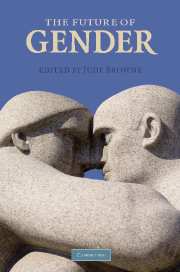Book contents
- Frontmatter
- Contents
- List of figures
- List of tables
- List of contributors
- Acknowledgements
- Introduction
- Part I Reorienting the feminist imagination
- Part II Variations on the theme of gender
- 4 Does biology play any role in sex differences in the mind?
- 5 Sex and the social construction of gender: can feminism and evolutionary psychology be reconciled?
- 6 ‘Trans’ trouble: trans-sexuality and the end of gender
- 7 Gender and social change
- 8 Procreative mothers (sexual difference) and child-free sisters (gender)
- Part III Gender and political practice
- Index
- References
5 - Sex and the social construction of gender: can feminism and evolutionary psychology be reconciled?
Published online by Cambridge University Press: 05 June 2012
- Frontmatter
- Contents
- List of figures
- List of tables
- List of contributors
- Acknowledgements
- Introduction
- Part I Reorienting the feminist imagination
- Part II Variations on the theme of gender
- 4 Does biology play any role in sex differences in the mind?
- 5 Sex and the social construction of gender: can feminism and evolutionary psychology be reconciled?
- 6 ‘Trans’ trouble: trans-sexuality and the end of gender
- 7 Gender and social change
- 8 Procreative mothers (sexual difference) and child-free sisters (gender)
- Part III Gender and political practice
- Index
- References
Summary
Standard opposition between sex and gender
These days it seems at best odd, at worst politically incorrect, to think sex has much to do with justice. On this now standard view, sex is a system of biological reproduction, a matter of natural fact. Gender, by contrast, is a culturally constructed role; gender roles, such as hunter or gatherer, breadwinner or homemaker, are socially imposed. Sex is a matter of nature, gender of nurture. Feminists argue that gender, not sex per se, raises concerns of justice between men and women. They deny that the inequalities and restrictions that go along with a traditional division of labour between the sexes result from the different natures of men and women. What is natural is relatively unalterable. Recognizing that traditional gender roles are culturally constructed radicalizes us: it allows us to see their injustice and empowers us to challenge it. So feminists tend to criticize evolutionary psychological explanations of gender roles for naively attributing too much to nature, too little to social conditioning.
The standard feminist view gets a lot right. Social conditioning does contribute to traditional gender roles. And the resulting unfairness is deeply embedded in the structure of human society. We do need to be radicalized, to recognize and challenge the gender role injustices we are still too often blind to.
- Type
- Chapter
- Information
- The Future of Gender , pp. 98 - 115Publisher: Cambridge University PressPrint publication year: 2007
References
- 1
- Cited by



